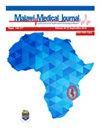Lived experience of people living with HIV in Blantyre, Malawi: An exploratory qualitative study
IF 1.2
4区 医学
Q4 PUBLIC, ENVIRONMENTAL & OCCUPATIONAL HEALTH
引用次数: 0
Abstract
Background People living with the Human Immunodeficiency Virus (HIV) encounter a range of complex challenges that impact their physical, psychological, and social well-being. The combined effects of these challenges significantly impact their daily functioning. Despite the relatively high prevalence of HIV in Malawi, there is limited knowledge on how the challenges experienced by people living with HIV correlate with their societal participation and performance of activities.ObjectivesThis study aimed to explore the lived experience of people living with HIV and how the challenges experienced impact societal participation and activity performance.Method: A qualitative exploratory study design was used. Fourteen participants were purposefully selected for the study, with an equal number of males and females. The data was gathered through semi-structured interviews and manually analyzed using thematic analysis.Results It was found that participants faced discrimination, stigma, depression, anxiety, and worries. The study participants associated their taking of antiretroviral therapy with physical impairments such as dizziness, leg pain, yellow eyes, and fatigue. The physical impairments hampered participants’ ability to walk, work, conduct business, perform household chores, and care for children.ConclusionThis study identified the difficulties that people living with HIV faced in their communities and how these challenges impact societal participation and performance in activities. There is a need for a holistic approach to managing these challenges and making referrals to specialized professionals.马拉维布兰太尔艾滋病毒感染者的生活经历:探索性定性研究
背景 人类免疫缺陷病毒(HIV)感染者会遇到一系列复杂的挑战,影响他们的生理、心理和社会福祉。这些挑战的综合效应严重影响了他们的日常功能。尽管马拉维的 HIV 感染率相对较高,但人们对 HIV 感染者所经历的挑战与他们的社会参与和活动表现之间的关系知之甚少:采用定性探索性研究设计。研究特意挑选了 14 名参与者,男女人数相等。通过半结构式访谈收集数据,并使用主题分析法对数据进行人工分析。结果发现,参与者面临歧视、羞辱、抑郁、焦虑和担忧。研究参与者将服用抗逆转录病毒药物与头晕、腿痛、眼睛发黄和疲劳等身体缺陷联系起来。这些身体缺陷妨碍了参与者行走、工作、做生意、做家务和照顾孩子的能力。有必要采取综合方法来应对这些挑战,并将他们转介给专业人员。
本文章由计算机程序翻译,如有差异,请以英文原文为准。
求助全文
约1分钟内获得全文
求助全文
来源期刊

Malawi Medical Journal
Medicine-General Medicine
CiteScore
1.50
自引率
0.00%
发文量
27
审稿时长
>12 weeks
期刊介绍:
Driven and guided by the priorities articulated in the Malawi National Health Research Agenda, the Malawi Medical Journal publishes original research, short reports, case reports, viewpoints, insightful editorials and commentaries that are of high quality, informative and applicable to the Malawian and sub-Saharan Africa regions. Our particular interest is to publish evidence-based research that impacts and informs national health policies and medical practice in Malawi and the broader region.
Topics covered in the journal include, but are not limited to:
- Communicable diseases (HIV and AIDS, Malaria, TB, etc.)
- Non-communicable diseases (Cardiovascular diseases, cancer, diabetes, etc.)
- Sexual and Reproductive Health (Adolescent health, education, pregnancy and abortion, STDs and HIV and AIDS, etc.)
- Mental health
- Environmental health
- Nutrition
- Health systems and health policy (Leadership, ethics, and governance)
- Community systems strengthening research
- Injury, trauma, and surgical disorders
 求助内容:
求助内容: 应助结果提醒方式:
应助结果提醒方式:


